Before Stephen King, H.L. Mencken, and H.P. Lovecraft, there was Ambrose Bierce. He was without doubt one of the strangest figures in American literary history. His work straddled several genres, including supernatural fiction, journalism, and literary criticism; and much of his output foreshadowed the trends in fiction and journalism of our own time. Irascible, bitter, and quarrelsome, he could also be generous, loyal, and incredibly brave. He deserves to be better remembered, for he is one of the few nineteenth-century American writers who can be said to be truly visionary.
The story of his life explains much about his literary themes and inclinations. Born in 1842 in Ohio as the tenth of thirteen children, his father was an eccentric man obsessed by religion and politics. Most of his siblings led dissolute and wayward lives, variously running off to join circuses or do missionary work in Africa; we may get an indication from this of the high level of domestic instability he was subjected to growing up.
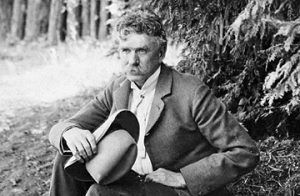
As a young man he was moody, withdrawn, and intense; and to this was added an true love of learning and literature. The outbreak of the American Civil War in the early 1860s saved him from historical oblivion. Enlisting in the Ninth Indiana Volunteers at the age of 19, he loved military life, perhaps because it gave him a purpose and structure that he had lacked.
By all accounts he was an extremely brave and competent combat soldier. He was so good, in fact, that he was given a battlefield commission as an officer, eventually serving on a general’s staff. He fought in the brutal Battle of Shiloh, and the horrifying things he saw there would haunt him till the end of his life. He would never be able to expiate the hellish visions lodged permanently in his memory. His ghost and horror stories are, more than anything else, products of these experiences.
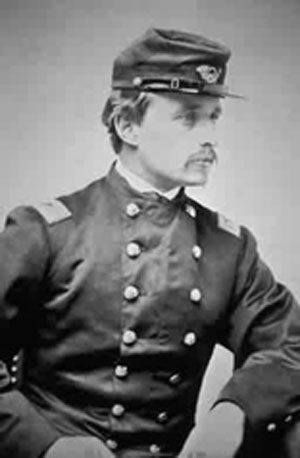
At the end of the war, Bierce moved out West to seek his fortune in the world of journalism. He eventually settled in San Francisco and began to churn out column after column of “social commentary” and criticism. This was the age of yellow journalism, robber barons, and gilded corruption; and there was no shortage of targets for “Bitter Bierce’s” (for he soon acquired this moniker) pen. Bierce was merciless in his attacks on ignorance, pettifoggery, stupidity, and smugness; he always went personal, and he went right for the jugular.
His diatribes spared no one: suffragists, politicians, clergymen, bad novelists, educators, businessmen, even close friends and companions. He had a complicated and neurotic personality which made it difficult for people to warm to him; although he was personally handsome and charming, this pleasant exterior masked a soul awash in venom and despair.
He would eventually alienate most of his friends and family. His upbringing and war experiences had, it seems likely, permanently shattered his faith in humanity. And although this attitude made him a profoundly unhappy man, it produced some of the most incredible writing in American letters. Much of his “attack” journalism would foreshadow the bitter vitriol found in many corners of the internet today.
A big break came for him in 1887 when he met and befriended the young William Randolph Hearst. Their twenty-year relationship would be a fruitful one, even though it ended as did most of Bierce’s relationships: that is, badly. Bierce reached a high point in his career when he exposed and thwarted the corrupt schemes of one of the worst of the robber barons, Leland Stanford. Standford had entered into a highly profitable arrangement with the federal government whereby he would obtain the use of public lands for railways for favorable loan terms.
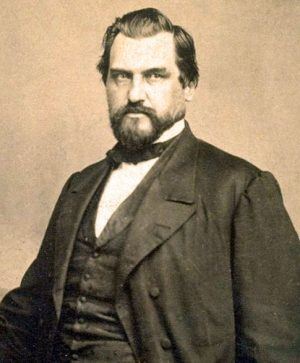
The corrupt Leland Stanford
When it came time for Stanford to begin making payments on the loans, which came to about seventy-five million dollars, he balked; instead, he had corrupt politicians in Washington introduce a bill that would forgive the debts. Stanford, essentially, then would have successfully used public funds to enrich himself and his business. Bierce exposed this scheme to the public; when Stanford tried to bribe him, Bierce named his price as “seventy-five million, payable with a check to the US Treasury.”
Although personally an unpleasant man, he had an unexpected sense of honor and honesty. And yet as he grew older, he became ever more cantankerous and acid. His temper, made worse by drinking, could flare up at the slightest provocation, whether real or imagined, with the result that few wanted to be around him. He divorced his wife, alienated his brother Albert, and lived to see his own children die in unhappy circumstances: one son was killed in a brawl and another perished from alcoholism.
The final act of his life was perhaps the best way it could have ended. In 1913, when he was 71 years old, he decided to go to Mexico to cover the civil war there. We are told that he tried to attach himself to Pancho Villa’s retinue as a war correspondent; what is certain is that he disappeared in Mexico, never to be heard from again. Many theories have been advanced on Bierce’s fate. It seems probable that he inevitably offended Villa in some way, and that he was either killed in battle or simply shot by bandits and buried in a shallow grave in the desert. It is unlikely we will ever know for certain.
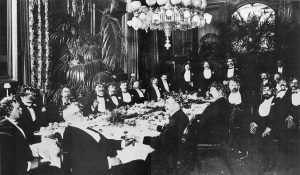
Bierce denounced the greed and excess of the Gilded Age
Such was the strange life of Ambrose Bierce. But what of his work? In many ways it anticipated the dislocation, alienation, and conflicted morality of the twentieth century and beyond. His stories deal with themes that later, more famous writers would take up: incest, patricide, masculine alienation, the darkness of the human mind, ghosts, the revenge of the dead, and the idea that evil deeds would have consequences. If Bierce was a brutal cynic, he was not an immoral one: there is an undeniable method to his madness, but he concealed it under so many layers of bitterness that few had the patience to peel them back.
It is my opinion that his wayward youth, and horrifying experiences in the Civil War colored his outlook for the rest of his life. His best stories, indeed, deal with the effects of trauma and death on the human body; his ideas about the catharsis of suffering and combat were just too startling to be appreciated by his contemporaries. He was a twentieth-century writer trapped in the nineteenth century. Some of his most imaginative techniques (e.g., the idea of telling a story from multiple angles) had to wait decades before they were taken up by filmmakers and other writers.
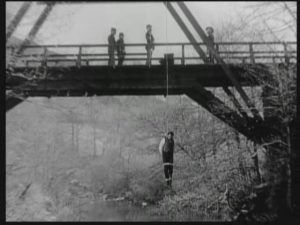
“An Occurrence At Owl Creek Bridge”
Some of his tales are masterpieces of mental derangement and horror. “The Damned Thing,” “The Middle Toe of the Right Foot,” “An Occurrence at Owl Creek Bridge,” and “Moonlit Road” are all deservedly well-known. In their use of weird irony, surreal narrative style, and use of flashbacks, Bierce’s stories have a much more “modern” feel to them than anything put out by his contemporaries. He rejected the self-satisfied smugness of his era, and was never able to get over the things he had seen in the Civil War.
But great artistry springs from conflict and strife, and for this reason alone we should give Ambrose Bierce his due.
Read More: 7 Things A Man Must Never Do
It’s a name I’d heard a few times, but I never had a good reason to look him up until now. Thanks.
Good read…and refreshingly, it wasn’t titled, “7 Things You Need to Know About Ambrose Bierce”. (Wink-wink.)
Agreed, I value articles like this. Have just added him to my reading list.
Fascinating. I’ll have to read some of Bierce’s material.
For such an eventful life to disappear without trace is truly a poetic and most fitting fate. I must look him up.
Byronesque, indeed. ;))
Not Byronesque but strip off about 40 years and add some boxing and it could be Arthur Cravanesque.
As well, Sir. Well noted. 🙂
The original TV production of “An Occurrence at Owl Creek Bridge” is available on YouTube. I have seen it several times over the years and I highly recommend it.
Yup – it was on the Twilight Zone. The guest director was french (and it was shot in France if I understand correctly)
I remember when my 8th grade teacher showed this during Literature class. It definitely got our attention, as the entire class participated in the discussion that followed. I have seen 2 other TV productions of this, one was on Alfred Hitchcock Presents, so Alfred got there before Rod!
Are you sure this is Twilight Zone? No Rod Serling, and I don’t recall ever having seen it.
Yes – Rod’s introduction was not in this youtube copy, but it was officially part of the Twiligjt Zone series. Serling had introduced the piece as having a guest director fr9m France.
This is the guy who said Friendship is a vessel that can carry two in good weather but only one in foul among other things as well as defining a bride as a young woman with good things and happiness behind her and only misery to look forward to.
Sadly, unless his “Devil’s Dictionary” is written entirely tongue-in-cheek, Bierce was almost certainly “blue pill” as it rags on men and lauds women.
One thing of note is that, despite his handicap, he still managed to hit the target regarding islam:
The Guy was Two Hundred Percent Sourpuss.
I like the Devil’s Dictionary myself.
The Devil Himself keeps it on His nightstand…along with Gurdjieff’s “Beelzebub`s Tales To His Grandson”…
🙂
Copies of LaVey’s works are usually used for hygienic purposes in Infernal Latrines. ;)))
Ambrose Bierce railed against Robber Barons later in life despite spending his youth fighting for them?
I wonder if that’s just another weird irony, or if he came to realize that, although he picked the winning side, he didn’t pick the right one.
Large scale business enterprise in the US is a post Civil War phenomenon. Before that war, the city with the largest number of millionaires was Natchez. in Mississippi. Yes, New York had wealthy men, but there were merchants, traders, and proprietors of traditional savings and loans banks. And, those bankers were Democrats to a man, supporting hard money.
And I see you know Firefly, which is of course all to the good.
The Civil War was started by the North pushing through tariffs that punished the South while benefiting the North. Northern manufacturers were able to exploit the resource-producing South with impunity and the South had stood all it could stand and broke away.
No representation in government, forced to provide raw materials on the cheap and buy back manufactured goods at a premium…the conditions of the antebellum South pretty much mirrored those of the Colonies before the Revolution.
If Bierce had been transplanted back a few decades, and England had triumphed, he would’ve been a Tory who railed against King George.
Thanks for this fine article. Bierce’s name keeps popping up here and there in my reading, but I never really knew anything about the man.
Leeland Stanford may have been a crook, but he was a pretty remarkable character in his own right. He founded a college that some have heard of, and was a patron of the groundbreaking motion photographer Eadweard Muybridge (yet another one of the extraordinary people that could only have existed in late 19th century California.)
I was surprised when I asked my father if I could read his new book “Dune” and he agreed. Many times when I’d asked to read his books he’d told me “No”. Maybe he said “Yes” because he’d recently caught me out caddying at Sea Eagle (the then British submariner base in Londonderry, N.I.), plus teaching children to ride at Jame’s Stables though I was then a child myself. I’d replied when he asked me why I was working behind his back and absent his knowledge that I’d small taste for begging (from my parents), but really liked having money. He loaned me “Dune”, Ayn Rand’s “The Fountainhead”, and a collection of stories by Ambrose Bierce, including “The Damned Thing”. I was thrilled because my father recognized that young and unprepared for real life as I then was he knew I’d faced challenges and adversity and would face more before my time was up. Not knocking my mother, however, unlike my father she wanted me to remain a biddable child in the hope I’d remain safe from harm while my father knew that childhood ends.
I bet the Fountainhead wouldn’t be read anymore in schools: isn’t there a scene where Howard Roark rapes Dominique?
Technically no, it’s basically really rough sex because Dominique is described as actually wanting it. I think that “rape” comes in because there was no “Affirmative Consent” and three different forms filled out and notarized by an attorney before Roark sexes her up (roughly).
As Rand herself put it “Rape by engraved invitation.”.But, then again, she was a self described man worshiper who, when asked how she developed this scene, replied “WIshful thinking”, which comment brought the house down.
Don’t recall, however it’s been years since I last read it.
The Fountainhead had a profound influence on me – a fascinating read for any freethinkers. For my fellow Christians, don’t be dissuaded by Ayn Rand’s atheism, her message is deep and valuable.
Are the other books you listed worth a shot as well?
I have read all her works and didn’t find her atheism a bother.
You have read Rand? I never would have guessed. 🙂
To me, yes. When I first read Dune I was taken by the adventure, romance, and sandworms. In subsequent readings I was captivated by the author’s, Frank Herbert’s, keen knowledge of interpersonal alliances, conflicts, and politics. It hasn’t gone stale over the decades, nor has his “Hellstrom’s Hive”. Ambrose Bierce’s works make for a most excellent palate cleansing after any SJW preaching session one may have unfortunately been a party to.
“His upbringing and war experiences had, it seems likely, permanently shattered his faith in humanity” A bit like Whitman or the Irish first world war 1 poet Francis Ledwidge. War mocks and makes fools of men, how often does an honorable solider die for the mean and mendacious plots of the cowardly politicians sitting in No.10 or the White House? No wonder he was bitter and scornful about those who sing about the glory and necessity of wars…people like Tony Blair and Hillary Clinton who’ll get their come ups in the next few days.
No way Hillary’s getting indicted. She’s untouchable.
Lets make sure she doesn’t become president. Drop by 4chan’s /pol/ and spread all the information about the Clinton’s Foundation links to fraud, money laundering, and pedo ring for the ultra rich and power.
Bierce was an American original. Florence King provides a compressed biography of him in her marvelous little book With Charity Toward None.
So did he write “An Occurrence at Owl Creek Bridge” to assuage his guilt at having voluntarily fought in the War of Northern Aggression?
He sounds like the typical American soldier, much like Captain Alvin York: lazy, indolent, lacking direction in his own life, and prone to violence. While Southerners were trying to defend their way of life and prevent slave insurrections that were intended to terrorize the White population, Bierce signs up for some adventure and a bit of sport.
While the besieged civilian population of Richmond was catching rats to eat, Bierce signs up like Hemmingway to collect experiences to inspire later literary pursuits.
Now go White man, kill your brothers. Lay down your life for the black slaves. March into the volley of musket fire and grapeshot. 150 years from now they will be so ever thankful for your sacrifice. LOLZ
Happy 4th Fuckers
Civil war was NOT about slavery
So he was a “good patriotic American” in his youth and signed up to kill Johnny Reb but in his later days tried to cozy up to Pancho Villa? Why didn’t he try to become a war correspondent as part of General Blackjack Pershing’s entourage?
Logic goes:
Killing White Southerners = good
Terroristic Chicanos = good
?
Ironically, this Gringo didn’t know who he fucking with and ended up with a Colombian necktie buried in Southern ground
Killed by Mexican banditos? You mean the noble savage wasn’t so noble after all? Who’s shocked here? I know I am.
Pershing’s expedition into Mexico occurred in 1916. Bierce died in 1913.
Fighting against the agrarian South, he helped usher in the industrial revolution of Rockefeller and Carnegie that made the Gilded Age and helped the robber barons amass their fortunes.
How exactly was the South more morally sound than the North? They imported cheap foreign laborers that were non-citizens, because they didn’t want to pay a living wage to white citizens. Destroying the culture and the country in the process. Then they sent off the poor whites to fight, while the slave owners exempted themselves from the battle.
Sounds like all the businesses and landlords that import alien labor in our time.
Sadly, the second civil war will likely be for the same reason.
“…sent off the poor whites to fight, while the slave owners exempted themselves from the battle.”
If you paid the US govt. $300, a small fortune for most, you could avoid conscription in the Union army.
Some things never change.
I remember seeing “An Occurrence at Owl Creek Bridge” at Holy Rosary my grade school way back in the day. I harken back to that often. When I’m on a road that has big trees that hang over each side think to myself hey that looks like An Occurrence at Owl Creek Bridge. I remember that final scene too. Funny that I would read about it here. Long live ROK.
I have to check out Ambrose Pierce’s work now.
Bom dia, encontrei seu site através de um artigo traduzido no Mídia Sem Máscara e tive uma grande surpresa! Bom trabalho!
Bravo, cara. Bem vindo ao site!
His aphorisms are contained in his famed book “The Devil’s Dictionary”. Here’s one all on this site may enjoy:
“Women! Would that we could fall into their arms without falling into their hands”.
I show “An Occurrence…” and then have students read it. It provides great fodder for dialogue and writing. Good stuff, Quintous.
Ambrose Bierce and Heinrich von Kleist are two of my most influential writers because they delved into darker realms than most of their contemporaries while at the same time remembering to keep the stories themselves interesting and moving forward.
For Bierce I recommend all the Civil War stories, most importantly “Chickamauga.” Another great one is “The Man and the Snake.” For von Kleist, ROK readers will be particularly interested in “The Marquise of O–“, and I also think “The Betrothal in Santo Domingo” was way ahead of its time.
I recently read the Bierce biography “Alone in Bad Company” by Roy Morris Jr. Recommended to any Bierce fans for sure.
Very curious to see what you’ll write on Spengler’s work. (By the way, his less known works are worth a thorough read, too.)